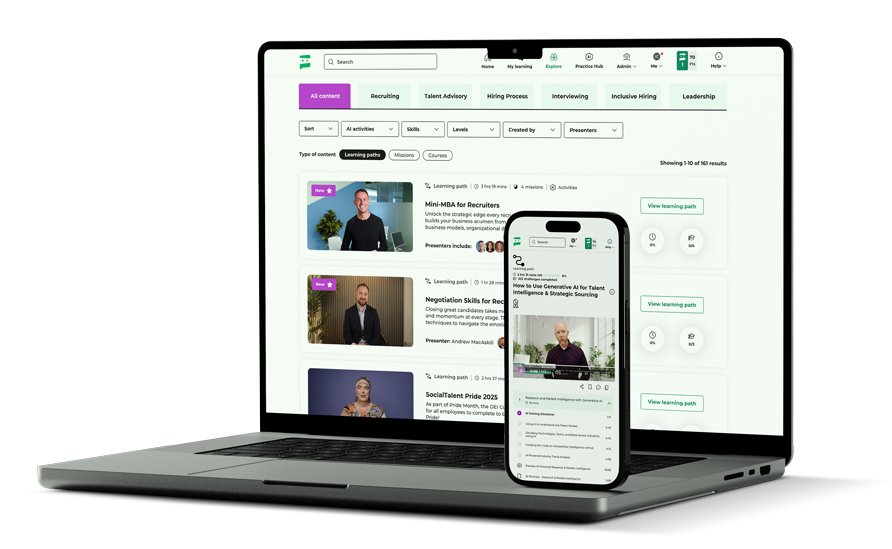
By David Deady
Change is inevitable. In every industry, in every workplace, bit-by-bit, we see processes, structures, roles, and tools evolve and transform. Usually this change happens at quite a methodical pace. Newness is introduced and accepted gradually – we didn’t all just jump headfirst into the internet or start using the cloud from day one! But when it comes to the rapid advent of AI, these conventions seem to have turned on their head!
Speed has defined the proliferation of artificial intelligence into the workplace – particularly in the role of recruitment. We recently hosted an online event – TA in the Age of AI – where, along with a cast of renowned industry experts, we dug into this phenomenon, dissecting its impact on Talent Acquisition. And what was the overriding klaxon from the discussion? A steadying call for balance.
According to polls we conducted during the webinar, 84% of organizations are using AI to some degree in their recruitment processes. And while most feel that AI will have a positive impact on the future of TA, over 80% also desire more of a balance between the human and AI when it comes to hiring decisions.
AI is set to transform Talent Acquisition. That much is absolutely true. But left unchecked and unstudied, it also has the potential to run rampant and disrupt the industry in profound ways.

1. A High-Tech, High-Touch Approach to AI
Our first panel of the event saw Natalie Glick, the Director of TA Strategy at BCG and Kelly Tomkins, the Global Recruitment Capability Lead at Accenture, pursue a discussion about how AI is interacting with the recruitment process.
Both extolled the benefits of the tech when it comes to productivity and performance. From helping to craft more accurate job descriptions to saving time on laborious admin, AI can take a lot of heavy lifting away from time-poor recruiters to focus on more strategic endeavors. Kelly gave one powerful example of this around interview feedback.
“We run over a million interviews a year and we know that our business doesn’t always have time to give great feedback – let alone any feedback – so having AI capture and summarize this is a huge help.”
It also gives Accenture an increased ability to understand interview performance and other insightful data that can be game-changing for candidate experience. However, Kelly also noted that their research tells them that for both candidates and hiring managers, the peak experiences within the process still involve interactions with people. Neither group has told them that AI has managed to create that peak moment.
Natalie echoed these thoughts, referencing a BCG project known as HT² – ‘High Touch, High Tech‘ – an approach where they aim to bring and maintain a very personal and human touch to candidate experience, while also having a high-tech, AI-driven power behind them. It makes sense to enable recruiters with AI to parse through thousands of applications, for example, but you must always ensure a human decision at the end of everything.
“Tech is there to help us, but the human needs to be there to make the decisions. Essentially it’s about finding out where the computer computes and the human engages.”
AI is going to see the role of TA evolve. It’ll speed up processes, provide accurate datasets, and blitz some of the drudgery of the role. But without the balance of human intervention, without those personal moments of connection and understanding, will it ultimately improve?
2. A Recruiter’s Duty of Care
Microsoft’s Thom Staight, the GM of Global Talent Acquisition in EMEA & Asia, joined Johnny Campbell, SocialTalent CEO, for an in-depth chat about how the company is tackling AI and what the future may look like.
Candidate experience was something that Thom immediately identified as a huge plus-point for AI. Already, Microsoft is using it to make the hiring journey as seamless and intuitive as possible. “Providing experience where there is no experience”, Thom says, referencing how they’ve leveraged AI to revolutionize job searches within the company. Rather than focusing on often bamboozling role titles, this new tool instead surfaces relevancy based on skills. It ensures that both internal and external candidates can quickly and easily be linked to jobs that match their prowess, rather than having to trawl through confusing lists.
However, balance was also a key theme. As Thom states:
“Just because we could do something and it’ll make us more productive, or agile, or flexible, if it’s going to give a less inclusive experience, then we’re not going to do it.”
Recruiting is regarded as a ‘high-risk AI activity’ – and it’s not surprising given how much sensitive and objective data TA folks deal with throughout the course of hiring. So it’s fundamentally important to show that we understand this. There is a shared responsibility to get AI right and make sure that we’re using it in sensible ways, rather than rushing into something because we think it’ll help us move faster.
“If people think we’re only able to improve our own experience and productivity, and are trying to save money at the cost of inclusion and fairness, then I think we’ll get overtaken by legislation.”
We have to be careful with AI, or else all the potential that the tools could offer will be lost in the fray.
3. AI is Here to Stay
The final panel, facilitated by our event partner, VONQ, collected insights from Yasar Ahmad, the Global VP of People at HelloFresh, Modiara Kamps, Head of Employer Branding at BCG, and Norma Taylor-Ladousse, CMO Talent Acquisition at L’Oréal.
When asked about the impact that AI has had, Yasar eloquently summed the last twelve months us perfectly, stating that:
“It’s had a lot of impact and not so much impact.”
Given how quickly we all jumped off the mark with AI and its potential, there has been this moment of pause. Referencing a Forbes article from early in 2023 where over half of 600 surveyed business owners said they were focusing on AI to improve operations, Yasar said the reality has instead been a grappling with how to actually use AI. Calling himself a ‘fast follower’ rather than an early adopter, he has seen some key areas around copywriting and efficiency that AI is already making a difference for Talent Acquisition, but it is early days. And vendors have a huge role to ensure that they are creating accessible AI options that are also compliant.
Modiara’s passionate plea for how much potential AI has, particularly around personalization and being a creative sounding board or partner, highlighted again what an exhilarating time this is. But it was Norma’s final point that really emphasized the need for vigilance and continued discussion:
“Even if we never do anything from an AI point-of-view, our candidates are using it. We have to keep up, we have to know exactly what they’re doing.”
It opens up a whole new set of questions on how you react to it as a recruiter, and it’s so important to educate on the topic of AI, on how to use it, how to interact with it responsibly, and embrace the possibilities. As Norma says “it’s a whole new world, but a very exciting world!”
Conclusion
The rapid integration of AI in Talent Acquisition heralds a transformative era, but one that must be underscored by a harmonious blend of high-tech efficiencies and the irreplaceable human experience.
With AI’s undeniable benefits in enhancing productivity, accuracy, and the overall candidate experience, the discussion shifts towards implementing AI responsibly. Ensuring a personal, human-centered approach in recruitment processes, while leveraging AI for its analytical and operational strengths, appears paramount. The call for a cautious, balanced approach resonates across the board, from corporate giants to innovative start-ups, reflecting a shared responsibility to harness AI’s potential ethically and inclusively.
As AI cements its role in the future of TA, the journey towards finding the optimal synergy between technological advancement and human insight continues to be both a challenge and an opportunity for the industry.


